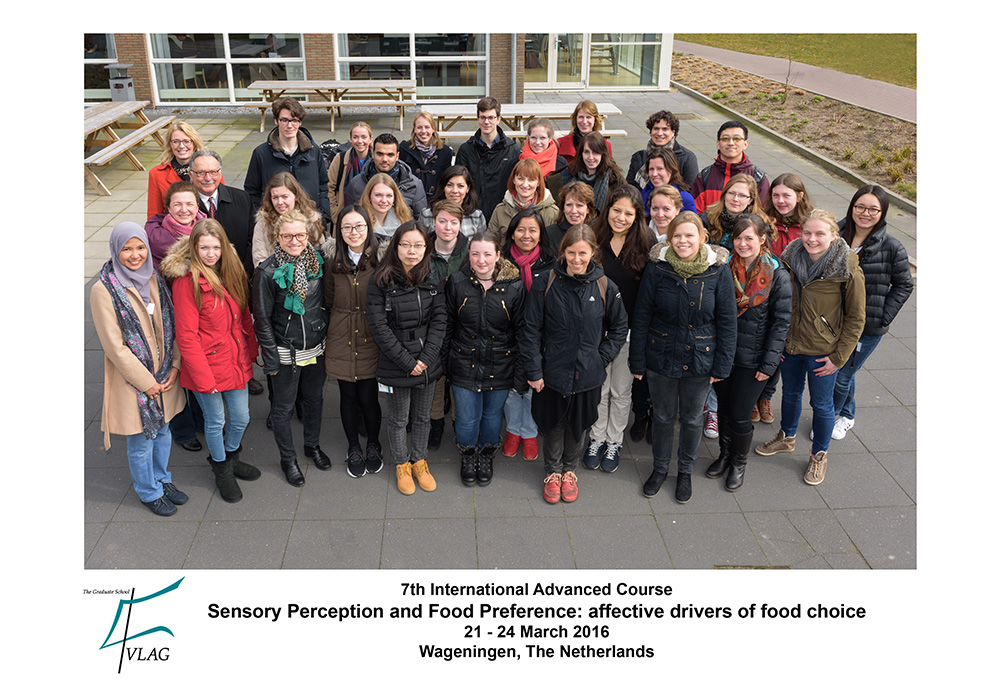Course
Sensory Perception & Food Preference: Affective drivers of food choice
7th Advanced training course to acquire expertise regarding the major determinants of food preferences: affective drivers and sensory perception

Background
Food preferences are a major determinant of food intake, and are largely driven by sensory properties of, and emotional responses towards food products. The course will focus on how food preferences develop and how they are maintained or changed in later life. Special attention will be devoted to perceptual and sensory determinants of preference behaviour and food intake. However, sensory factors do not function in isolation; they act within a certain context and can elicit emotional responses. A large part of the course will be devoted to emotion and affective responses in relation to consumer behaviour, and the various methodology available to measures this.
Target group
The course is at graduate level and aims at food scientists, nutritionists and other sensory- or consumer behaviour-related professionals. The course may be valuable for graduate students working on a PhD related to eating or consumer behaviour, or emotion and sensory perception, and for those working in the food industry.
Course aim
The aim of this advanced training course is to acquire expertise regarding the major determinants of food preferences: affective drivers and sensory perception; to obtain knowledge and experience in different methods on how to measure and analyse these aspects.
Course design
The course will be mainly composed of lectures with ample opportunity for discussions. There will be short presentations of the research plans of the participants, an excursion to the Restaurant of the Future, as well as a workshop/demo on various methods to measure and analyse behavioural responses to food products.
Programme topics
The following topics will be addressed:
- the role of emotions in food preference
- development of and changes in preference over the life span
- marketing and consumer side of eating behaviour and emotions
- the role of emotions in non-food related consumer behaviour
- methodology of measuring affective responses and food preferences
- multisensory perception and experience
- the role of sensory perception in food preferences
- an industry perspective on the role of sensory science
- food perception and affective responses in the brain
Download programme
Organisation
Course coordinators
- Dr. S. Boesveldt, Prof. C. de Graaf, Dr. G. Jager, Wageningen University, Division of Human Nutrition
Other faculty
- Dr. S. Griffioen-Roose or Dr. S. Lindeman, FrieslandCampina
- Dr. I.E. de Hooge, Dr. B. Piqueras Fiszman, Wageningen University, Marketing and Consumer Behaviour
- Dr. S. Kremer, Wageningen UR, Food & Biobased Research
- Dr. H.L. Meiselman, Senior Research Scientist (retired), Natick Labs, USA
- Dr. H.N.J. Schifferstein, TUDelft, Department of Industrial Design
- Dr. P.A.M. Smeets, Wageningen University, Division of Human Nutrition
- Dr. E.H. Zandstra, Unilever R&D Vlaardingen
- Dr. H. van Zyl, Heineken, Sensory and Product
Workshops
- Dr. J.M. van der Horst, Wageningen UR, Food & Biobased Research
- Dr. L. Loijens, Noldus
Date & duration
The course will be held from Monday 21 -24 March 2016, and will be conducted in English.
Study load
The study load of this course is 1.1 ECTS credits.
Language
The course language will be English.
Contact information
More information about the contents of the course can be obtained from Mrs. Dr Sanne Boesveldt:
email: sanne.boesveldt@wur.nl
For organisational matters please contact Mrs. Ingeborg van Leeuwen-Bol:
email: ingeborg.vanleeuwen-bol@wur.nl
Location & accommodation
The course venue is Conference Centre Hof van Wageningen (www.hofvanwageningen.nl).
The town of Wageningen is 5 km from Ede-Wageningen railway station, with transport options being taxi or bus. Ede-Wageningen railway station is about one and a half hours from Amsterdam Schiphol Airport. For train schedules visit: www.ns.nl.
The organisation has blocked a number of hotel rooms at “Hof van Wageningen” for course participants, but only until 6 February 2016. Accommodation costs are € 75,- (single room; incl. breakfast, excl. tax) per night. You can visit: http://www.hofvanwageningen.nl/ for more information.
Participants have to book their own hotel room by sending an email: info@hofvanwageningen.nl (do not book your room via the Hof van Wageningen website).
Please mention booking code SENS16.
Registration & course fee
To be able to fill in the registration form, you need a "VLAG-events account".
To create this account, please click here: create account.
If you already have a "VLAG-events account" you can directly go to the course registration form.
The final registration date is 7 February 2016.
Registrations are accepted in the order in which the registration form and course fee payment are received.
Applicants will be informed of acceptance of their registration before 5 February. They will then receive instructions for payment, and further course details. Cancellations may be made free of charge until 7 February 2016. After this date the charge will be 25 % of the course fee already paid or due. Substitutions for participants may be made until the start of the course.
The course fee (which includes materials, coffee/tea during breaks, lunches and one dinner but does not cover accommodation) depends on the participant's affiliation:
| PhD candidates affiliated with VLAG | € 200 |
| PhD candidates | € 500 |
| University staff / Non -Profit | € 700 |
| Industry / For-Profit | € 1600 |
Cancellations may be made free of charge within 6 weeks after registration but before 19 December 2016. After this date the charge will be 25 % of the fee paid or due. Substitutions may be made at any time.
Download
